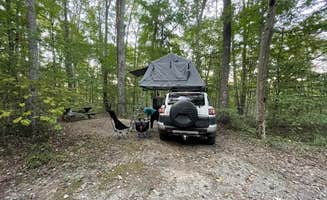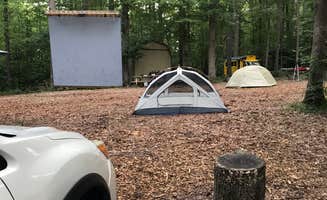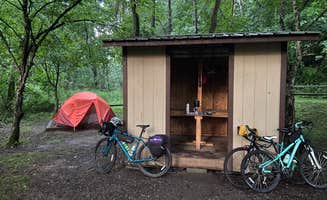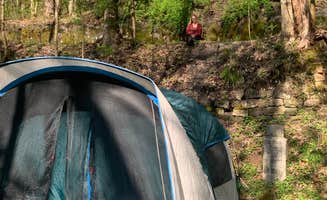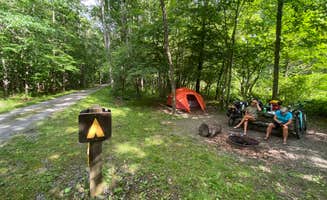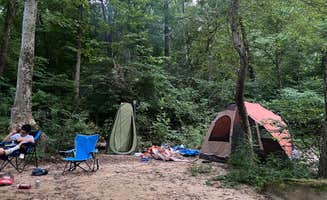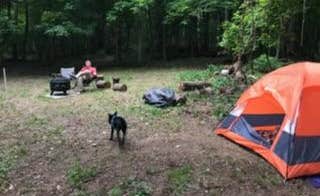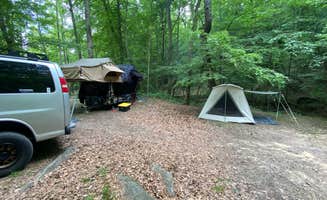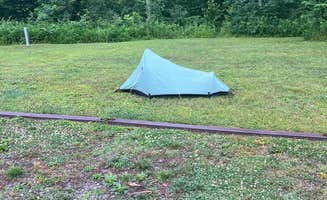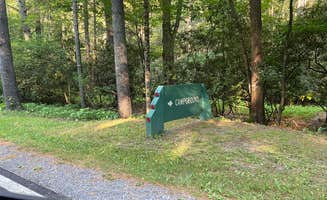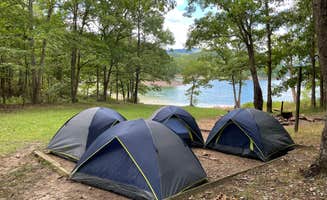Tent camping near Craigsville, West Virginia provides access to the Monongahela National Forest's eastern edge where elevations range from 2,000 to 4,000 feet, creating distinct microclimates throughout the camping season. Summer temperatures typically reach highs in the mid-80s while dropping into the 50s at night, making sleeping bags necessary even during July and August. These temperature swings create morning fog conditions common along river valleys where many campsites are located.
What to do
Water activities at Summersville Lake: 15 minutes from Chestnut Creek Campground with swimming, fishing, and boating options available from April through October. "This campground is less than a mile from the Canyon Rim Visitor Center and the Bridge and only 15 minutes from Summerville Lake!" reports camper Sienna L.
Hiking on Endless Wall Trail: 5-mile route with exceptional views of the New River. According to Linda L., "We hiked Endless Wall Trail and Glade Creek Trail to Kate's Falls" while staying at Chestnut Creek Campground, making it an ideal base camp for day hikes.
Rock climbing at various difficulty levels: The region has routes suitable for beginners through experts. "Great launching pad for river activities and climbing," notes Katie M. about her stay at Chestnut Creek. The area attracts climbers of all skill levels with over 1,400 established routes within the gorge.
Train watching along riverfront campsites: Active rail lines provide regular train viewing opportunities. At Brooklyn Campground, "You can watch trains pass on the opposite side of the river," according to camper Cody T., making it a unique attraction not found at most wilderness camping areas.
What campers like
Privacy between sites: Natural barriers create secluded camping experiences. "Sites are primitive with plenty of trees for and shade and hammocks," reports Ashley B. about her experience at Chestnut Creek Campground. The wooded settings provide natural site boundaries.
Waterfront camping options: Several sites offer direct river access for swimming and fishing. At Stone Cliff Campground, "There are 4 nice spots down on the beach... and two up a small hill close to the parking lot and trailhead," notes Kaylee F., providing options for those who prefer riverside or elevated camping.
Shelter availability during rain: Some primitive sites include covered structures. "Newer Adirondock Style Shelter" is available at Greenbrier River Trail Milepost 63.8 according to Dave V., offering protection during frequent summer afternoon thunderstorms.
Wildlife viewing opportunities: The natural setting supports diverse animal sightings. "Wildlife and songbirds were abundant and as shocked to see you as you were them. Oftentimes, the deer would run the trail ahead of you for 200 yards before cutting off onto their sidetrail," reports a camper at Greenbrier River Trail.
What you should know
Variable bathroom conditions: Facilities range from well-maintained to rustic. At Day Run Campground, "There are 2 restrooms located in this camping area with vault toilets only. Take your own toilet paper if campground isn't busy because it doesn't get maintained daily and we ran out," advises Christy M.
Per-person pricing model: Many campgrounds charge by camper rather than by site. "The campground charges per person which was different from what I'm used to, but it was very reasonable and comparable to other campgrounds in the area," explains Debra W. about Chestnut Creek, where rates typically run $15 per person.
Limited or no cell service: Communication options vary widely by location. "This is West Virginia, so even in populated areas cell service can be spotty...but on the trail, I would not count on it," notes Dave V. about the Greenbrier River Trail camping areas.
Seasonal operation considerations: Many campgrounds close during winter months. "Our visit was the first full weekend in November and many other campgrounds were closed for the winter," shares Cathy D. who stayed at Chestnut Creek, one of the few year-round options.
Tips for camping with families
Beginner-friendly sites for kids: Look for flat, established areas with bathroom access. "This campground was perfect for what we needed for a 2 night stay... All sites are big and you can pick from any available," explains Sienna L. about Chestnut Creek Campground, noting its accessibility and convenience.
Educational opportunities: Incorporate local history into family trips. "Traveling the Greenbrier River Trail allows the traveler to be sent back in time...passing through old Railroad towns, seeing old Railroad buildings, water towers offers a glimpse backwards," says Dave V., making these sites ideal for family history lessons.
Weather preparation essential: Sudden temperature changes require proper gear. "The wind just seemed to come out of nowhere being in a small valley the storms were very strong. We were having to restake the corners throughout our stay," warns David about Meadow Creek Campground, emphasizing the need for sturdy tent stakes.
Noise considerations: Train activity may disrupt sleep for sensitive children. "The trains are fun to watch but very loud and frequent," notes David about Meadow Creek Campground, where trains pass "as often as every 20 minutes" according to camper reports.
Tips from RVers
Size restrictions at most sites: Many campgrounds limit vehicle size or prohibit RVs entirely. "This is a very nice little campground set up for tents, hammock campers and some car campers. No hook-ups. Definitely not for RVs or Camper trailers," advises Lisa K. about the best tent camping near Craigsville at Chestnut Creek.
Access challenges: Railroad crossings and narrow roads affect larger vehicles. "You have to cross train tracks to get here and it's 4 sets of tracks all are very active with trains coming as often as every 20 minutes and they do not stop," cautions David about Meadow Creek Campground, which formerly allowed RVs but now restricts use to tents only.
Consider primitive car camping: Vehicle-accessible tent camping provides a middle option. Jay F. notes that Chestnut Creek "is a primitive campground so don't come looking to hook up to electricity," making it better suited for tent camping or small vans without hookup requirements.


